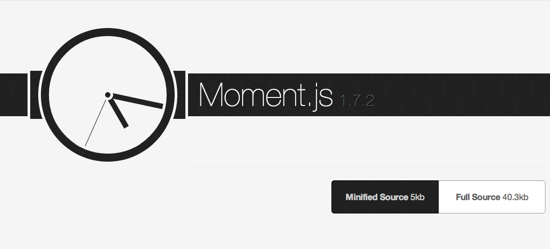

Get a date and time from a timestamp with Moment.js It's similar to native JavaScript's new Date(). This returns an object with the date and time based on your browser's location, along with other locale information. Get the current date and time with Moment.js const now = moment() See the Moment.js documentation for more details.

Moment js parse utc install#
To start using Moment.js, install it through a package manager like npm, or add it to your site through a CDN. That's where Moment.js shines – it makes parsing, formatting, and displaying dates a breeze. Every country seems to have a different way of formatting dates, and accounting for different time zones and daylight savings/summer time takes, well, a whole lot of time. Getting dates and times right is no small task. Fortunately there are a number of methods to do just that: const birthday = new Date(' 06:27:39') īirthday.getTime() // 1528838859000 (milliseconds since the Unix Epoch)īirthday.getTimezoneOffset() // -540 (time zone offset in minutes based on your browser's location) Make Working with Dates Easier with Moment.js Often you will not need the entire date, but just part of it like the day, week or month. You can also pass some, but not all, time zone codes: const exactBirthdate = new Date(' 06:27:00 PDT') Ĭonsole.log(exactBirthdate) // Thu 01:27:00 GMT+0900 (Korean Standard Time) Date Object Methods To avoid this, pass in a time zone along with the string: const exactBirthdate = new Date(' 06:27:00 GMT-1000') Ĭonsole.log(exactBirthdate) // Thu 01:27:00 GMT+0900 (Korean Standard Time) This can lead to errors where the date returned is off by many hours. When passing a date string without setting a time zone, JavaScript assumes the date/time are in UTC before converting it to your browser's time zone: const exactBirthdate = new Date(' 06:27:00') Ĭonsole.log(exactBirthdate) // Wed 06:27:00 GMT+0900 (Korean Standard Time) You can also use the Date.parse() method to return the number of milliseconds since the epoch (January 1st, 1970): Date.parse('') // 86400000ĭate.parse('') // 1560610800000 Setting a time zone All of the examples below return valid Date objects: new Date('2019-06') // June 1st, 2019 00:00:00 Getting the date this way is very flexible. Get a date and time from a string const stringDate = new Date('15:00:00') Will return Friday, January 2nd, 1970 (UTC). In a day there's 86,400,000 milliseconds so: const dayAfterEpoch = new Date(86400000)
Moment js parse utc plus#
New Date(ms) returns the date of the epoch plus the number of milliseconds you pass in. The Unix Epoch is important because it's what JavaScript, Python, PHP, and other languages and systems use internally to calculate the current time. This represents the time at Thursday, January 1st, 1970 (UTC), or the Unix Epoch time. Get a date and time from a timestamp const uni圎poch = new Date(0) Note that the months are zero-indexed, beginning with January at 0 and ending with December at 11. The syntax is Date(year, month, day, hour, minute, second, millisecond). Mon 12:58:21 GMT-0400 (Eastern Daylight Time) Get a date and time with individual values const specifiedDate = new Date(2019, 4, 29, 15, 0, 0, 0)
Moment js parse utc how to#
How to Create a Date Object Get the current date and time const now = new Date()

This tutorial will teach you everything you need to know about working with dates and times in your projects. You should elaborate with specific details in a new question.Welcome to our ultimate guide on the JavaScript Date object and Moment.js. On the last item you mentioned about time zones, it's difficult to tell what you are asking. If the utcDateTime is already in ISO8601 format, and contains either a Z or an offset like -01:00, then that will be taken into account and you can simply do this: moment(utcDateTime).format(specifiedFormat) moment.utc(utcDateTime, utcDateTimeFormat).local().format(specifiedFormat)Īgain, there's more than one way to do things here. No, you do not need to create a new moment using the generated date object. Once you have a moment object, you can use toDate or format or any other of the functions described in the documentation.

On Item 2 - Just like the utc() function, there's also a local() function. Since UTC is implied by the output, it would be redundant to call utc() again. However, if the output format is just going to be an ISO8601 UTC timestamp, then you can call toISOString directly on the original moment. On Item 1 - Yes, that's one way to do it.


 0 kommentar(er)
0 kommentar(er)
